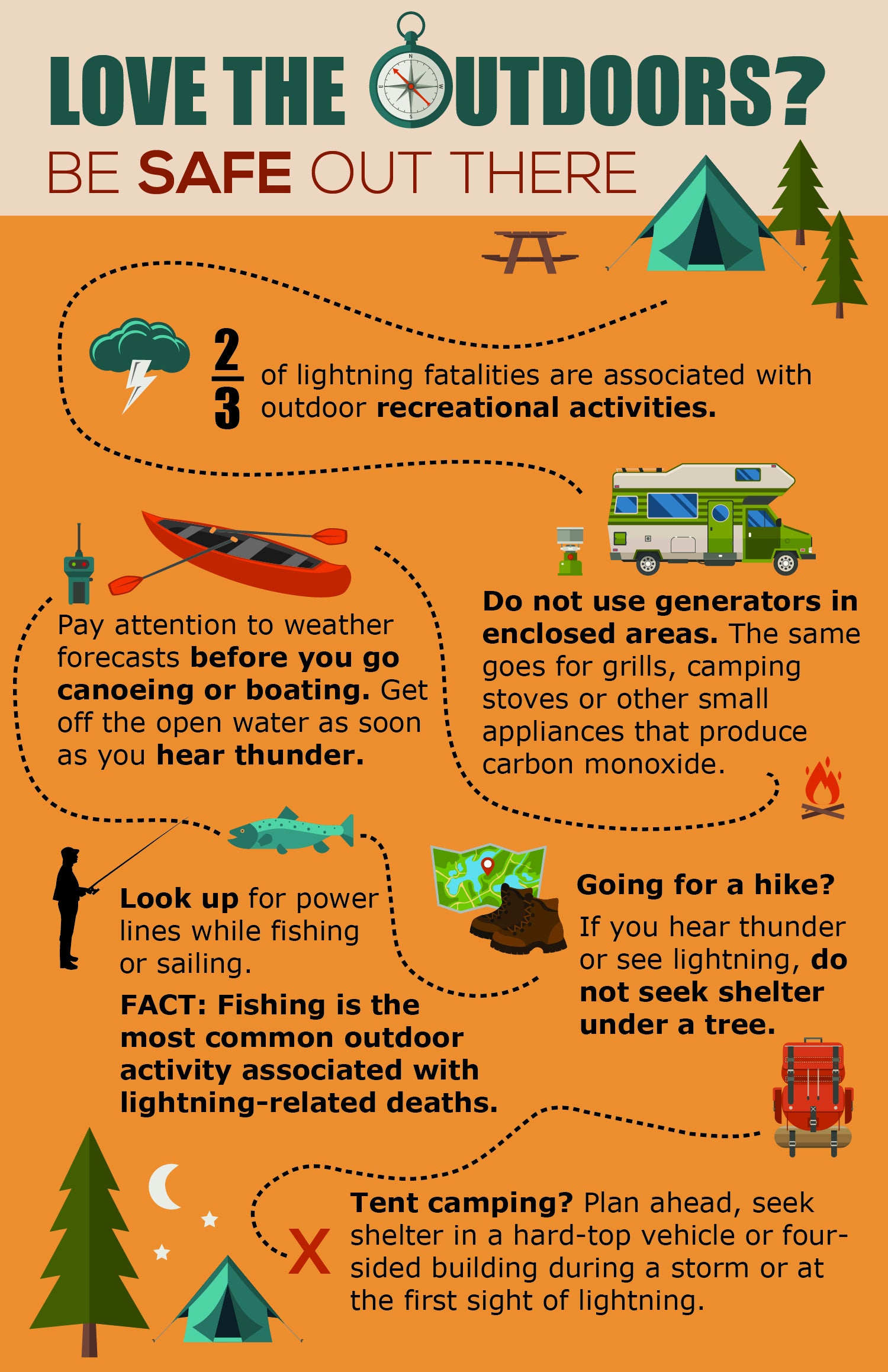Create a peaceful experience
Camping is a delightful way to unwind and connect with nature, but it's essential to prioritize safety, especially when it comes to electricity. Whether you're staying in an RV or camping trailer (camper), understanding electrical safety measures is crucial to ensure a worry-free camping experience.
Preparation is key: Know before you go
Knowing the correct amp service for your RV/camper and your family’s needs is one of the first things you should determine, even before booking your campsite. When booking your site online or talking to campground staff directly, you will typically have the option to choose a 30- or 50-amp site. This is determined by the maximum current flow your RV/camper is designed to handle. A 30-amp RV/camper is built to consume up to 30 amps of current flow, while a 50-amp RV/camper is built to consume up to 50 amps. Exceeding this current flow will result in a tripped breaker or blown fuse.
What is the difference between a 30- and 50-amp system?
Below are the main ways a 30- and 50-amp RV/camper electrical system differ:
1. Plugs:
- 30-amp service requires a three-pronged plug consisting of a 120-volt hot wire, a neutral wire and a ground wire.
- 50-amp service requires a four-pronged plug, including two 120-volt hot wires, a neutral wire and a ground wire.
2. Maximum wattage:
- A 30-amp service will typically provide up to 3,600 watts of power.
- A 50-amp service will typically provide up to 12,000 watts of power.
3. Number of outlets:
- A 30-amp RV/camper typically has fewer outlets compared to 50-amp RV.
4. Breaker panel:
- Typically, a 30-amp RV/camper has a single row of breakers.
- Alternately, a 50-amp RV/camper typically has a split breaker panel. This allows heavy amp draw components to be divided between the two sides of the panel.

What can you power with each system?
It is extremely important to understand the average draw of your RV/camper appliances. Avoid using all of your appliances at the same time, as this can overload circuits and cause breakers to trip or fuses to blow. Here are the average amp draws for some major RV/camper appliances:
- Air conditioner: 15 amps
- Electric heating element for water heaters: 10 amps
- Microwave: 10 amps
- Refrigerator: 5 amps
Appliances with heating elements consume large amounts of power and may require shutting off other devices to operate safely. Space heaters/electric fireplaces can quickly eat up the amount of wattage available for use so be extra careful when running these. Other appliances that draw amperage include televisions, coffee makers, hair dryers, onboard converters and more.
If you are unsure about what amp service you need or how much you can run from your RV/camper, or if you think you may need to upgrade your service, contact a licensed electrician for more information before you head out on your camping trip.
Surge protection for RV/camper hookups
When connecting your RV/camper to an electric outlet at a campground, surge protection is a must. Surge protectors safeguard your RV/camper's electrical system from power surges and fluctuations, which can cause damage to appliances and electronics. Invest in a quality surge protector designed for RV/camper use and make sure it's rated for the power supply at your campground.
Special cords and equipment
Depending on the campground's electrical setup, you may need special cords or adapters to connect your RV/camper safely. It's essential to come prepared with the right equipment to avoid any compatibility issues or safety hazards. Invest in high-quality, weather-resistant cords and connectors designed for outdoor use to ensure reliable power supply throughout your camping trip.
Charging your battery
Properly charging your RV/camper's battery before your camping trip is essential for ensuring reliable power supply during your outdoor adventures. Make sure your battery is fully charged and in good condition before hitting the road.

When you arrive at the campground
Now that you know what type of service you can hook up to, let’s explore what you’ll need to look for when you arrive at the campsite.
Follow the rules
When hooking up your RV/camper to the electrical service at a campground, always follow the campground's specific instructions and guidelines. Make sure to use the appropriate electrical adapters and connectors for your RV/camper's power requirements and double-check that all connections are secure before powering up. If you're unsure about anything, ask campground staff for assistance. They are there to help make your camping experience safe and enjoyable.
Inspect electrical pedestals
Before hooking up to an electrical pedestal at a campground, take the time to inspect it thoroughly. Look for any signs of damage, corrosion or exposed wiring. Ensure that the pedestal is properly grounded and that all outlets are in good working condition. If you notice any issues or concerns, notify campground staff immediately and do not use the pedestal until it's been inspected and repaired.
Keeping Kids Safe
Kids are naturally curious and adventurous, which is why it's essential to teach them about electrical safety from a young age. Ensure that children understand the dangers of playing near electrical outlets and cords. Establish clear boundaries and designate a safe area away from electrical hookups where children can play freely without risk of injury.
Hooking up in the rain
Rainy weather can add an extra layer of challenge when setting up your camper's electrical connections. While it's tempting to get everything set up quickly, safety should always come first. When hooking up to electricity during rainy conditions, take extra care to keep yourself and your equipment dry. Consider using a waterproof cover or tarp to shield the electrical connections from moisture and avoid standing in puddles or wet areas while handling electrical cords and plugs.

During your camping adventure
Once you are safely set up, it is time to relax and enjoy the great outdoors! Just remember there are still a few things you should keep in mind should an unexpected concern pop up.
Concerns About Severe Weather
While camping offers a unique opportunity to connect with nature, it's essential to be mindful of severe weather conditions, including lightning storms. When severe weather is forecasted, take proactive measures to protect yourself and your equipment. Unplug electrical cords and disconnect from campground power sources to reduce the risk of electrical damage or injury. Seek shelter in designated campground facilities until the severe weather passes.
Other Basic RV/camper Safety Tips
- Regularly inspect and maintain your RV/camper's electrical system, including cords, outlets, and appliances.
- Keep electrical cords and outlets away from water sources to prevent electric shock hazards.
- Never attempt to repair or modify electrical components unless you're qualified to do so.
- In case of electrical emergencies, know how to shut off power to your RV/camper and have emergency contact information readily available.
Safety practices for heating an RV/camper
If you will be camping when the weather is a bit chilly, you may want to heat your RV/camper. However, safety should always be a top priority. If using an electrical space heater, ensure that it's in good condition and equipped with safety features such as tip-over protection and overheat protection. Place the heater on a stable surface away from flammable materials and never leave it unattended while in use.
Using propane for heating can be convenient but also poses potential risks. If using propane heaters or appliances, make sure they're properly installed and ventilated to prevent the buildup of carbon monoxide. Install carbon monoxide detectors inside your RV/camper and test them regularly to ensure they're functioning correctly.
By following these electrical safety guidelines and practicing caution and awareness, you can enjoy a safe and enjoyable camping experience in your RV/camper. Prioritize safety at all times, and you'll be able to relax and make the most of your outdoor adventures without worry. So, pack your bags, hit the road and embark on your next adventure; it's time to make some unforgettable memories in the great outdoors! Happy camping!
